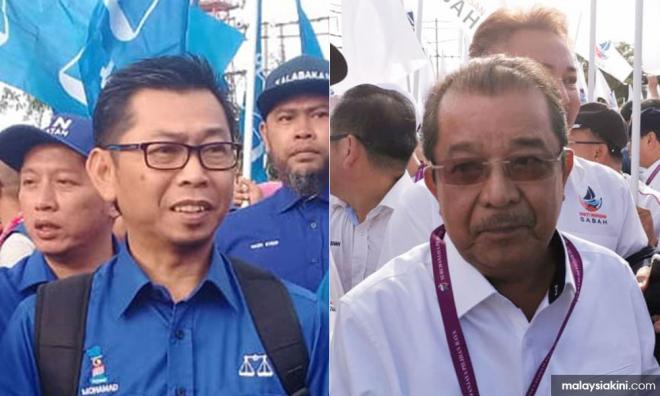
With the final legal appeal decided on Friday and nominations yesterday, the year begins with the 10th by-election since GE14 – Kimanis in Sabah.
Located on the west coast of the state, this parliamentary seat has traditionally been an Umno stronghold – and was claimed by former foreign minister Anifah Aman and younger half-brother of the former Sabah Chief Minister Musa Aman in the last general election by a narrow margin of 156 votes. After an electoral petition ruled against him for discrepancies in the electoral counting process, the contest is up for re-election.
No longer a member of Umno, Anifah has opted not to recontest, saving his energies and finances for future battles. Instead, Umno has slated former Bongawan state assemblyman Mohamad Alamin to defend the party’s position in Sabah. Warisan, on its part, has offered voters its previous candidate, Karim Bujang – also a former assemblyman for Bongawan for Umno.
The contest will test the relatively new party’s continued strength in the state, notably the leadership of Warisan, Sabah Chief Minister Mohd Shafie Apdal. His party aims to secure a victory in the home ground of the Aman family at the parliamentary level of his political rival, as Warisan already holds one of the two state seats in this constituency.
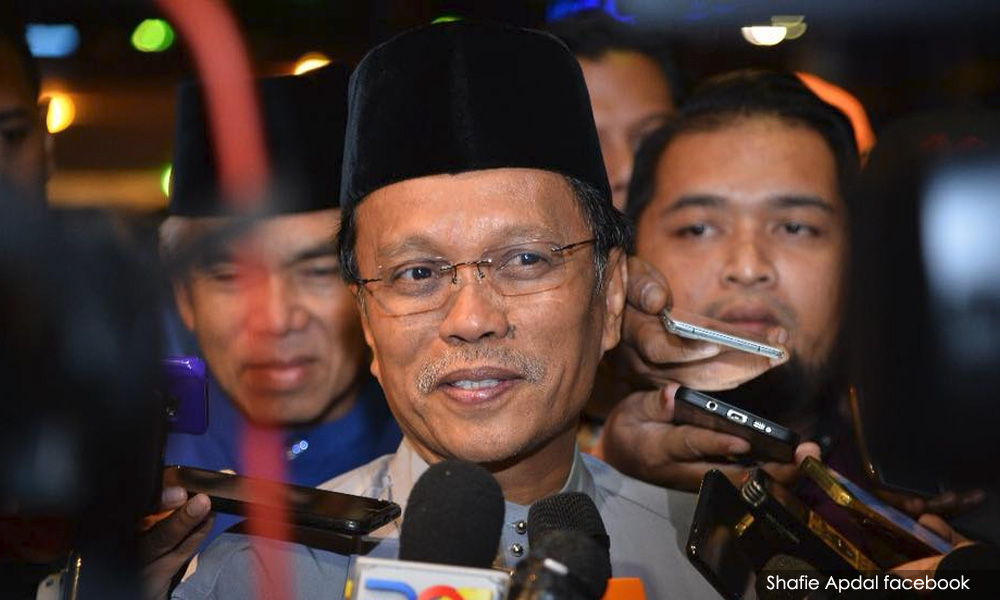
Unlike many of the battles in the Peninsular, this contest will centre on local state dynamics. Its outcome, however, will be important in setting the direction for Sabah politics and in turn how Sabah will continue to impact national politics. Key in this regard are whether Umno will continue to have a base in East Malaysia and whether Warisan, as an important kingmaker in parliament, has the leverage to push for Sabah-based issues on the national stage.
A close look at previous voting patterns and practices in the seat suggest that while Warisan will have the advantage, it is not as clear a favourite as would appear on the surface. Kimanis is a competitive seat.
A Sabah poll
Sabah is Sabah – and despite attempts to equate the by-election with national trends, the most salient starting point is local politics.
In GE14, Warisan and its Pakatan Harapan allies won 29 state seats and formed the state government with a slim majority. It was tough going ousting the Aman family from power. Kimanis, an Aman stronghold, was right in the middle of it, One undercurrent in this by-election is the Aman-Shafie rivalry, and while Anifah may not be contesting the seat he has held for four terms since 2004, energies will be harnessed to assure that the seat is not given to the rival. The Aman family controls significant resources and political capital. Kimanis will continue the battle for power at the state level.
At the same time, the by-election battle tests post-GE developments. Three important shifts have occurred in Sabah politics since GE14.
Foremost is the collapse of Umno in the state. In February last year, mass defections from the party have left the party a shell of what it was. It is now led by the colourful and controversial Bung Moktar Radin, who cried to evoke support as he announced the Kimanis candidate the day before he attended his own ongoing trial for corruption. Tested as a state assemblyman, Alamin represents the bridge to the past, but at the same time faces an uphill battle rebuilding the support for the party that has been badly discredited.
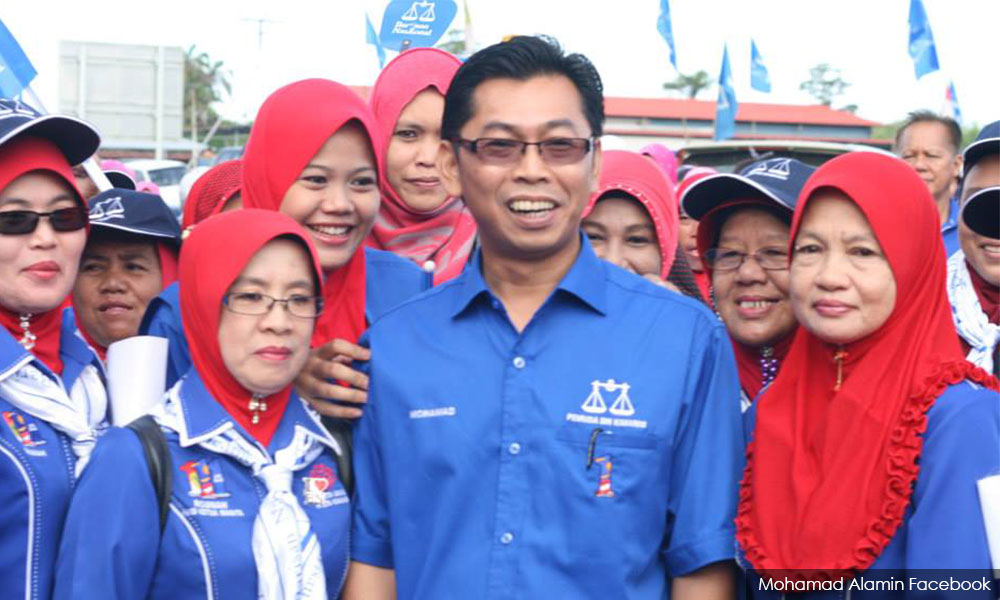
Alamin is further hampered by the burden of Umno’s cooperation with PAS in the Muafakat Nasional. The responses so far by Umno leaders reveal a willingness to throw out the alliance to ameliorate the liability of the relationship with the Islamist party for the Sabah electorate. Kimanis showcases the limits of alliance across Malaysia as a whole and reveals a lack of consensus surrounding the pact, even within the parties to the pact itself. While Sabah Umno has been officially given more autonomy in the Umno general assembly last month, it is burdened by the baggage it carries from the Peninsular in facing the Kimanis multiracial electorate.
Complicating Sabah politics is the entry of Prime Minister Dr Mahathir Mohamad’s Bersatu – a move deeply resented by Warisan supporters and Umno as well, as many of the former members left to join the ‘new Umno’ Bersatu. While Bersatu is not competing, its presence is felt as it is part of the battle. One of the two state seats in Kimanis (Membakut) is held by an Umno defector to Bersatu. Both parties contesting want to win decisively to offset Bersatu’s entry into the state and their possible political displacement.
Anifah’s own new Sabah-based party is also another potential player, as the political playing field has become more fluid and varied. The popularity of locally-based parties and those tied to the Peninsular continues to evolve as state nationalism targeting Putrajaya remains a powerful mobiliser.
Finally, now 20 months on since GE14, the by-election tests the support of Shafie’s leadership at the state helm. Warisan faced lower expectations in Sabah than Harapan across the sea. Sabahans have experienced a change in power before and understand first-hand the limits of political change, especially when there is a lack of broad institutional reform.
That said, the Warisan-led state government has distinguished itself by supporting the United Examination Certificate (UEC), placing a limit on child marriage at 18 and even putting MACC officials in the Chief Minister’s office. There was a modest cabinet reshuffle after the passing of Steven Wong. Although largely cautious and avoiding unpopular decisions, it has shown itself to engage in outreach and not cowed away from making some hard decisions. It has vested energies in tacking some of the serious underlying problems of the state.
The Sabah government has actively sought to plan a programme on poverty reduction and controversially proposed the Sabah Temporary Pass (PSS), a temporary document for many migrants, touching on the pressing but emotional illegal immigrants (PTI) issue. The Shafie government has also negotiated hard on the issue of the oil royalty and representation, winning approval for more seats in the delineation but yet to secure clarity on revenues from the centre.
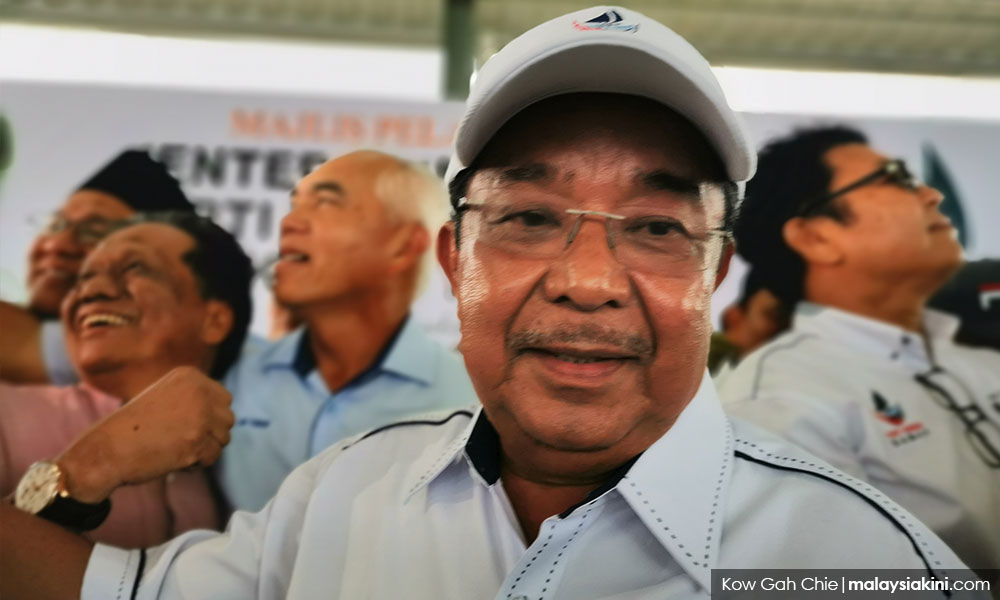
The Warisan-led government’s main weakness has been the economy. As with the Harapan government as a whole, the state government has struggled with translating economic growth into gains for ordinary citizens and grappled with building confidence in the more uncertain global and regional environment. It also has wrestled with managing the environment and resources, with criticism of land development, notably Tajung Aru and the Kaiduan/Papar Dam, and slow implementation of reforestation measures.
Questions about the use of resources also extend to issue of patronage as well, with concerns over some of his close appointees. With Warisan contesting, Shafie’s governance comes under scrutiny. Perhaps more than any other post-GE14 by-election to date, Kimanis revolves around state and local governance.
A complicated local terrain
Kimanis is a fascinating seat to analyse at the local level. The seat, a gateway to Labuan, has long had diversity in its composition, with considerable growth in the numbers over the years tied to new migration.
Drawing from the 2018 electoral roll, it comprised 75 different categories for registered ethnic groups, with the majority of these Brunei Malays and Kadazan/Dusuns (KDM). The third largest group is the ambiguous “Bumiputera Sabah” category – listed under ‘Others’ and seen as a temporary administrative label. The rubric used below captures the main groups in the state as a whole. As Table 1 shows, Malay, KDM and Other communities vote in the highest numbers, followed by Bajau-Sulok and Chinese, which had the highest drop in turnout in GE14.
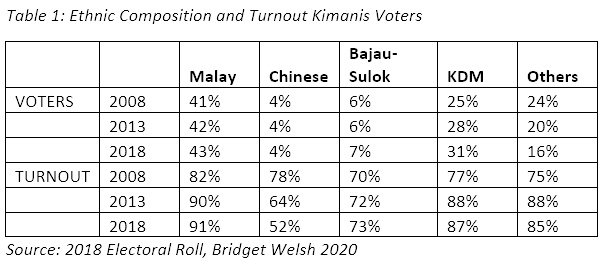
Few outside of Sabah appreciate how local ethnicities shape electoral outcomes. The simple frames of Malay-Chinese-Indian-Others have little relevance in Sabah, as inter-ethnic differences and representation of smaller communities matter. This understanding traditionally worked to the advantage of BN, which was able to accommodate the different ethnic communities in distributing seats and played into the rationale for the creation of new seats in the last delineation exercise in Sabah and Sarawak.
These inter-ethnic loyalties also shaped the GE14 Kimanis result – the choice of candidate appealed to Brunei Malays due to the Warisan’s candidate origin. Anifah was seen to represent other Malays, specifically of Pakistani origin (from his father), and gain support from Dusun (from his mother) due to his own mixed heritage. Warisan’s connections to the Bajau-Suluk, through Shafie’s leadership, also tapped into loyalties in voting.
The drops in support for Umno/BN from 2013 to 2018 along ethnic lines outlined in Figure 1 in voting along ethnic lines were shaped by these ethnic local ties. Malay support dropped by an estimated 24%, Bajau-Suluk support by an estimated 9%. The drop in support among KDM was more modest. BN on its part retained support among others, including Pakistani and “Bumiputera Sabahans”.
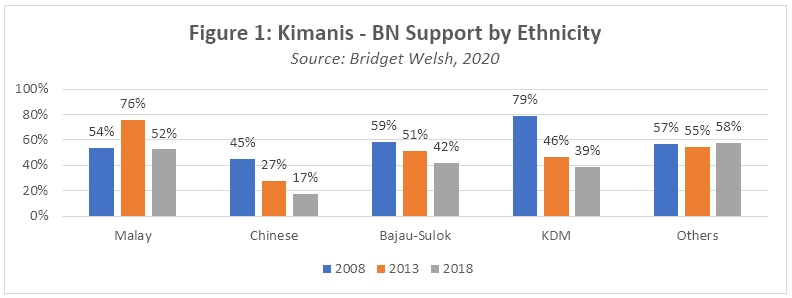
Ethnic ties will continue to matter. This election with Umno’s Alamin’s mixed heritage (Bruneian Malay (father) and Kadazan Dusun (mother), Warisan’s Karim will not have the same ethnic advantage among Brunei Malays, the largest group in the seat. Who wins the majority of this community, will likely win the seat.
The other area where ethnic loyalties will be tested is among the KDM community, the second largest group. While Kimanis witnessed a drop in KDM support for Umno, by an estimated 7%, this was not the case for quite a few seats across the state where this community was dominant.
Overall in Sabah, based on my assessment of all the Sabah seats in GE14, KDM support for BN remained strong, with the BN picking up 5% of support among these communities. Their main concern was the representativeness of KDM interests within Warisan, and underlying resentment toward immigrant communities such as Bajau and Suluk who are seen to comprise Shafie’s strongest supporters. Today, there is considerable disgruntlement - even quiet anger – regarding the granting of a temporary pass to people who are seen as illegal immigrants (PTI), as this issue (announced last September) remains highly emotive in Sabah.
Along with local ethnic loyalties, the GE14 results show that generation voting was important in shaping the final outcome. Young voters comprise over 40% of Kimanis voters. As was the case nationally, they were decisive in Umno’s loss of support.
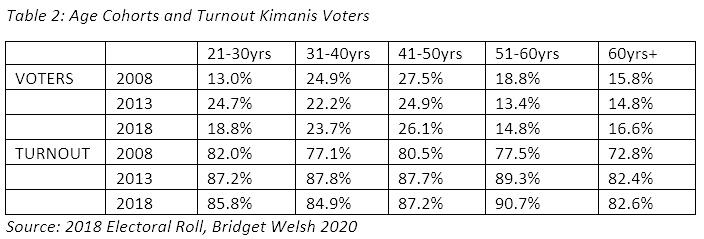
Figure 2 shows that estimated support for Umno/BN among young voters fell by over 15% in GE14, nearly 20% among voters under 30. Warisan will have to hold onto the support of younger voters to win the seat. Given disgruntlement over the economy, the main concern of young voters, this will be a challenge for Warisan.
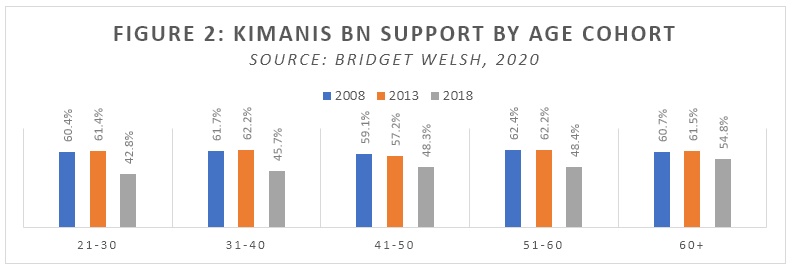
Sabah’s contest will rest on how the local appeals and issues connect to these key groups. While the court judgment threw out of allegations of vote buying, which testimony suggested reached as much as RM3 million, the question of resources and how they are used will also be important. Umno will have to decide how much it is willing to spend to save itself and Warisan will also have to choose how it will navigate this dynamic. Development projects are already being announced. At least, so far, Sabah campaigning suggests similar appeals and engagement to the past.
In the end, this election is important for Shafie’s leadership, a bellwether at the state level. For his party, Warisan, with the defections providing a safe majority and dominance at the state level, the stakes are not as high as those for Umno. A defeat here for Malaysia’s former BN dominant party will send a clear signal that voters are looking toward new parties and envision a non-Umno Sabah. This time around, it is Umno who is looking at the barrel of a gun.
Expect the battle to be intense given the stakes and hope that is does not come down to unclear new voters, pressured recounts and mysterious ballots.
BRIDGET WELSH is a Senior Research Associate at the Hu Feng Centre for East Asia Democratic Studies, a Senior Associate Fellow of The Habibie Centre, and a University Fellow of Charles Darwin University. She recently became an Honorary Research Associate of the University of Nottingham, Malaysia's Asia Research Institute (UNARI) based in Kuala Lumpur. - Mkini


No comments:
Post a Comment
Note: Only a member of this blog may post a comment.